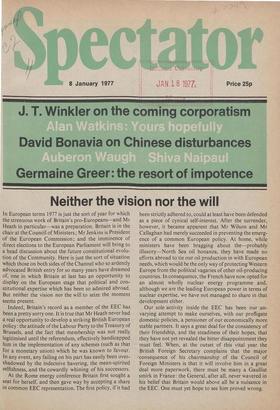Neither the vision nor the will
In European terms 1977 is just the sort of year for which the strenuous work of Britain's pro-Europeans—and Mr Heath in particular—was a preparation. Britain is in the chair at the Council of Ministers; Mr Jenkins is President of the European Commission ; and the imminence of direct elections to the European Parliament will bring to a head discussion about the future constitutional evolution of the Community. Here is just the sort of situation which those on both sides of the Channel who so ardently advocated British entry for so many years have dreamed of, one in which Britain at last has an opportunity to display on the European stage that political and constitutional expertise which has been so admired abroad. But neither the vision nor the will to seize the moment seems present.
Indeed, Britain's record as a member of the EEC has been a pretty sorry one. It is true that Mr Heath never had a real opportunity to develop a striking British European policy : the attitude of the Labour Party to the Treasury of Brussels, and the fact that membership was not really legitimised until the referendum, effectively handicapped him in the implementation of any schemes (such as that for a monetary union) which he was known to favour. In any event, any failing on his part has easily been overshadowed by the indecisive havering, the mean-spirited selfishness, and the cowardly whining of his successors.
At the Rome energy conference Britain first sought a seat for herself, and then gave way by accepting a share in common EEC representation. The first policy, if it had been strictly adhered to, could at least have been defended as a piece of cynical self-interest. After the surrender, however, it became apparent that Mr Wilson and Mr Callaghan had merely succeeded in preventing the emergence of a common European policy. At home, while ministers have been bragging about the—probably illusory—North Sea oil bonanza, they have made no efforts abroad to tie our oil production in with European needs, which would be the only way of protecting Western Europe from the political vagaries of other oil-producing countries. In consequence, the French have now opted for an almost wholly nuclear energy programme and, although we are the leading European power in terms of nuclear expertise, we have not managed to share in that development either.
Our sole activity inside the EEC has been our unvarying attempt to make ourselves, with our profligate domestic policies, a pensioner of our economically more stable partners. It says a great deal for the consistency of their friendship, and the steadiness of their hopes, that they have not yet revealed the bitter disappointment they must feel. When, at the outset of this vital year the British Foreign Secretary complains that the major consequence of his chairmanship of the Council of Foreign Ministers is that it will involve him in a great deal more paperwork, there must be many a Gaullist smirk in France: the General, after all, never wavered in his belief that Britain would above all be a nuisance in the EEC. One must yet hope to see him proved wrong.


































